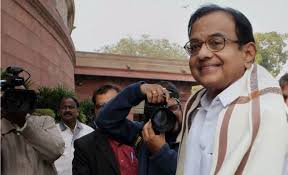 New Delhi, Feb 28: Finance Minister P. Chidambaram presented one of the most highly anticipated Indian budgets of recent years on Thursday, as the government looks to rein in a bloated fiscal deficit and restore confidence in Asia's third-largest economy.
New Delhi, Feb 28: Finance Minister P. Chidambaram presented one of the most highly anticipated Indian budgets of recent years on Thursday, as the government looks to rein in a bloated fiscal deficit and restore confidence in Asia's third-largest economy.
Following are highlights of the budget:
Rs. 2 trillion for defence sector
First housing loan up to Rs 25 lakh would get additional deduction of interest of up to Rs 1 lakh
Insurance companies can now open branches in Tier 2 cities and below without prior approval. All towns of India with a population of 10000 or more will have an LIC branch and one other public sector insurance company.
Income limit for the tax-saving Rajiv Gandhi Equity Savings Scheme is raised to Rs. 12 lakh from Rs. 10 lakh
All public-sector banks have assured the Finance Minister that they will all have ATMs in their branch areas by 2014
India's first women's bank as a PSU proposed, Rs. 1,000 crore working capital announced
Regulatory authority to be set up for road sector
Four Infrastructure debt funds have been registered
Rs 7 lakh crore target fixed for agri credit for 2013—14 compared to Rs 5.75 lakh crore in the current year.
Eastern Indian states to get Rs 1,000 crore allocation for improving agricultural production.
Green revolution in east India significant. Rice output increased in Assam, Odisha, Jharkhand and West Bengal;
Rs 500 crore allocated for programme on crop diversification
Average annual growth rate of agriculture and allied services estimated at 3.6 per cent in 2012—13 when 250 MT foodgrains was produced
Rs 27,049 crore allocation to the Agriculture Ministry in 2013—14
Rs 14,873 crore for JNNURM for urban transportation in 2013—14 against Rs 7,880 crore in the current fiscal
Foodgrain production in 2012—13 will be over 250 million tons
Rs 15,260 crore to be allocated to Ministry of Drinking Water and Sanitation.
Rs 80,194 crore allocation for Ministry of Rural Development in 2013—14. About Rs 33,000 crore for MGNREGA
Rs. 5,000 crore for NABARD for agri storage facilities
Godowns to be constructed with help of panchayats. Food grain productions have been raised drastically and only increase with each year.
Rs 17,700 crore to be allocated for Integrated Child Development Scheme (ICDS): FM.
“National Food security bill is a promise of the UPA government. I hope the bill be passed as soon as possible. I have set apart Rs 10,000 crore to the expected cost of the act.”
An Institute for agricultural biotechnology will be set up in Ranchi, Jharkhand.
Rs 1069 crore allocated to Department of Aryush: FM
Rs 4,727 crore to be allocated for medical education and research. Rs 1,069 crore to be given to Department of Ayush.
Medical colleges in six more AIIMS—like institutions to start functioning this year; Rs 1650 crore allocated for the purpose.
Rs 37,330 crore allocated for Ministry of Health & Family Welfare.
Rs 110 crore to be allocated to the department of disability affairs, says FM.
Additional sum of Rs 200 crore to Women and Child Welfare Ministry to address issues of vulnerable women.
Rs 3511 crore allocated to Minority Affairs Ministry which is 60 per cent of the revised estimates.
Rs 13215 crore for mid-day meal programme: Chidambaram
The idea of setting up a PNGSY-2 causes uproar in the Parliament. The minister is interrupted the round of shouting, who clarifies that states that have completed PNGSY -1 will get the second version, the rest will continue under the first version
The Right to Education Act is firmly in place, says Chidambaram, while announcing Rs. 27,250 crore to Sarva Shikhsa Abhiyaan in FY14.
The Human Resources Development ministry meanwhile gets Rs. 65,867 crore, a rise of 17% from revised estimates.
"Government committed to reconstruction of Nalanda University" - But no specific funds for the project was announced.
Chidambaram announces additional fund allocation of Rs 200 crore to the Women and Child Development Ministry. He says women 'belonging to the most vulnerable groups must be able to live with self-esteem and dignity'.
169 crore given for development of Ayurveda, Siddha, Unani (Natural medicine) and homeopathy
Rs 41,561 crore for SC plan and Rs 24,598 crore for tribal plan. The move comes with a strong statement





Comments
Add new comment